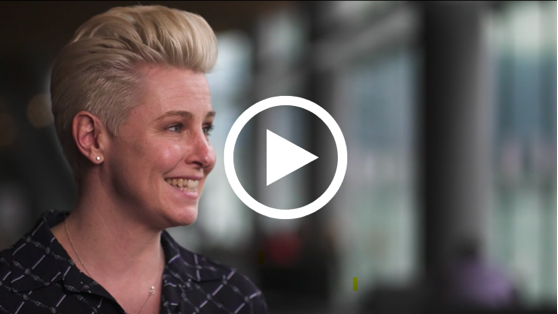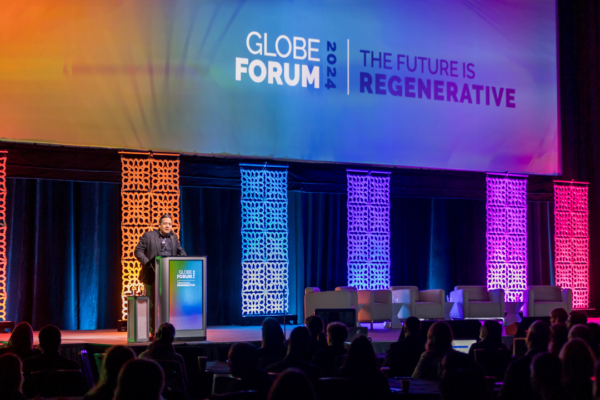By Mike Rowlands, President and CEO, Junxion Strategy
The global pandemic continues to unfold around the world, showing us the fragility of economies, social systems, and even ourselves. As we think about how we might ‘emerge stronger’ and ‘build back better,’ many of us are calling for recovery planning to carry us into a purpose-led, 21st century economy.
We know now, beyond doubt, that businesses that put social purpose at the centre of their strategies perform better: B Corp businesses—businesses that meet the highest standards of uniting profit and purpose—are growing 28 times faster than the average company. And early in the pandemic, JUST Capital reported that the 20% of companies ranked highest on stakeholder leadership have outperformed the bottom 20% by 4.7% through the current bear market and the first signs of recovery.
A just, sustainable recovery will be achieved by businesses working together with government, NGOs, and other stakeholders to design a purpose-led economy.
This is a story with a long history…
It’s been nearly 40 years since a raucous group of misfits first got together to talk about a new approach to business, ultimately forming Social Venture Circle (SVC). They were responding in part to American economist Milton Friedman’s statement that the “one and only… social responsibility of business [is to] increase its profits.”
Impatient with an economic model that valued growth above all else, they sought to understand how their ventures might support communities, regenerate landscapes, and create equitable prosperity for all—rather than concentrating wealth in the hands of a privileged few. Instead of seeing communities as groups of “individuals pursuing their separate interests,” SVC’s founders saw communities as groups with shared interests committed to mutual benefit and collective wellbeing.
The early luminaries that founded SVC—folks like Ben Cohen and Jerry Greenfield of Ben & Jerry’s fame, Anita Roderick of The Body Shop, and Joel Solomon, Chair of Renewal Funds, Canada’s biggest social venture capital firm—built enterprises that showed how social purpose and financial success reinforce each other. They worked across sectors in business, government, academia, and charities to create a powerful network that continues to grow today.
Over the decades, SVC members founded many organizations equally committed to environmental stewardship and social progress: the American Sustainable Business Council; Business for Social Responsibility, which influenced the founders of CBSR; Net Impact, which engages graduate business students; B Lab, the nonprofit behind the B Corp Certification; and many more.
This is of course just a tiny sample of the purpose-led organizations emerging on every continent. In the past 20 years, their mandates have embraced environmental sustainability in the face of climate change, evolved to influence social entrepreneurship, and coalesced in the work of many to push businesses—and entire economies—toward a scope of social purpose much wider than Friedman’s.
Social purpose is already driving business success
Each January, the international public relations firm Edelman releases its annual ‘Trust Barometer,’ a global study of public trust in institutions of media, government and business. In 2020’s issue, the schism between the ‘haves’ and the ‘have-nots’ was starker than ever before. The central takeaway is this: societal discontent is now at a level that business cannot ignore.
As governments around the world are increasingly seen as part of the problem, rather than as providers of solutions, business has stepped into the void. The Business Roundtable’s commitment to social purpose is one result. Nearly 200 multinational corporations’ commitments to the UN Global Compact’s Business Ambition for 1.5ºC is another. But perhaps most significant is the extraordinarily rapid rise in stakeholders’ expectations of the corporate sector: “A stunning 92 percent of employees surveyed in the 2020 Edelman Trust Barometer say that they expect their employer’s CEO to speak up on one or more issues ranging from income inequality to diversity and training for jobs of the future.”
The world expects more of business leaders. Making a clear commitment to a social purpose is the new imperative for brand trust—and brand trust continues to be a litmus test for business health, driving employee engagement, stakeholder loyalty, and yes, quarterly returns. Centering business strategy in social purpose is a hallmark of 21st century leadership.
The importance of social purpose to business success is likely to become even more pronounced in the next decade with the rise of the millennial generation, the current demographic wave. A ten-year study by the Case Foundation found that millennials:
- Are everyday changemakers. They think about social change and progress all the time—in their work, but also at play, with their purchase decisions, and more.
- Believe in activism. They actively engage on the issues they care about—including through their elected representatives.
- Care about social issues. Millennials are a significantly empathetic generation; they support organizations and movements that improve the lives of others.
- Are passionate about issues, not institutions. More than 90% of surveyed millennials said they’d stop giving if they lost trust in a charity or nonprofit. They’re also happy to change their jobs, if their employer loses their trust.
- Value collective action and networks. Movements like #BlackLivesMatter, the climate action movement, and Extinction Rebellion have proven the value of collective action to lift issues to the top of governments’ and businesses’ priorities.
In short, any business (or organization) that wants to engage and retain millennials must pay attention to social purpose and align their actions with their values, and their employees’ sense of what’s right.
What’s next for Canada?
For nearly 40 years, efforts have been made through grassroots organizations on every continent to advance social purpose and environmental responsibility among businesses. These local efforts are coalescing in a broad, inclusive, and global shift in thinking about the role of business in society.
Were we writing this article 20 years ago, we would have been focused on sustainability, and strategies to reduce businesses’ negative impacts on the planet. Were we writing it 10 years ago, we may have been looking at social entrepreneurship as a means to inclusive employment. Today, these movements have fused with others to put the social purpose of business at the forefront of what it means to be a leader.
As we navigate through COVID-19’s devastating effects on health, our economies, and on society as a whole, business has a fundamental and essential role to play. If we’re to emerge stronger, or ‘build back better,’ we must also think about a social purpose economy.
As emergency responses give way to economic recovery, we encourage leaders to think about economic renewal, as well. Let’s rebuild with well-being at the centre of our economic thinking. Let’s create the incentives for businesses and citizens alike to make choices that are better for people and the planet.
We encourage you to join us in our support for a purpose-led recovery as we call on the Government of Canada to put well-being first, and rebuild with a social purpose economy.
A strong, healthy, purpose-led recovery is my business. It’s your business. It’s our business.
–
Please plan on joining us next April at GLOBE Capital 2021 to continue this timely discussion. The theme is “Delivering Returns for People and the Planet,” and among other critical topics we will be unpacking how and why “purpose pays” – for our economy, for our environment, and for society. If you are interested in partnering with us for this first-of-its-kind hybrid virtual and in-person event, please contact Claire Melanson.
We also invite you to join Junxion Strategy, GLOBE Series and many other Canadian leaders in adding your name to this statement of support for a purpose-led recovery.




